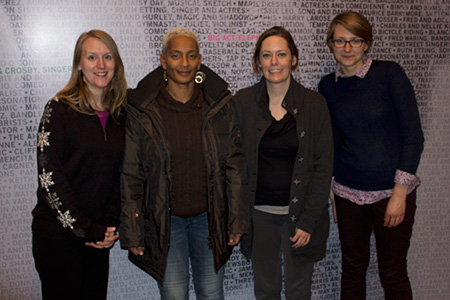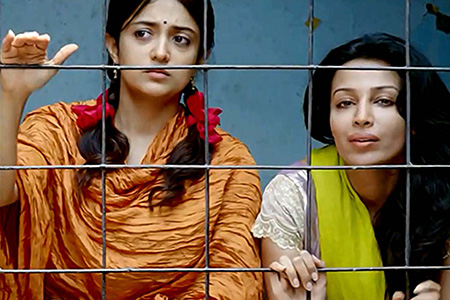Internet hides sex trafficking, experts say

Melanie Matson, director of Emerson’s Violence Prevention and Response, with Audrey Morrissey of My Life, My Choice; Beth Bouchard of Children’s Advocacy Center of Suffolk County; and Greta Spoering, survivor advocate at Emerson; before a screening of Lakshmi and discussion on human trafficking at the Paramount Center on December 2. (Photo by Dan O’Brien)
A panel of experts, including a woman who identifies as a survivor of the sex trafficking industry in Boston, took an in-depth look at the horrors that lurk within the booming underground trade after a screening of Lakshmi in the Paramount Center on December 2.
Released this year in India, Lakshmi is a dramatic—and graphic—film based on true events, which depict the terrifying story of a 14-year-old girl named Lakshmi who is kidnapped and sold into prostitution—forced to endure rapes and brutal beatings.
“Everyone knows this happens in foreign countries, but our children are trafficked right here in the United States,” said Audrey Morrissey, a survivor of the sex trafficking industry who is now associate director of My Life, My Choice, a local organization dedicated to ending sex exploitation. “They’re in these hotels all over the Boston area.”
Morrissey was a panelist in a discussion following the film screening, which was held as part of the Bright Lights Series. The talk was moderated by Melanie Matson, director of Emerson’s Violence Prevention and Response, and also included Beth Bouchard, a case coordinator at the Children’s Advocacy Center of Suffolk County.
Morrissey and Bouchard said the demand to help underage victims of human trafficking at their respective organizations is high—and growing.
“[In the past decade] we’ve been referred over 965 cases for exploited youth just in Suffolk County,” Bouchard said.
“As quick as we train [outreach workers], we’re full, and we need more money to hire someone else,” said Morrissey, who said volunteers are welcome to help young girls build life skills and self-esteem.
Morrissey, who is in her 40s, said she frequented the former Combat Zone in Boston in her teenage and early adult years, working in prostitution and strip clubs. She believes the number of girls and women involved in the underground sex trade has likely increased due to the Internet.
“To me, this Internet makes it scarier,” she said. “When I was in the Combat Zone, people would see me. If I was gone for a while, people would ask, ‘Have you seen her?’ But when you’re…putting children in hotel rooms, they’re not visible.”
Bouchard said the average age of a person entering the sex trade is between 12 and 15 years old.

A scene from Lakshmi, a recently released Indian movie about a 14-year-old girl who was kidnapped and sold into prostitution.
When responding to a question from an audience member who said he favored legalized prostitution, Morrissey said, “Anywhere where there’s an adult sex industry, there are always children present.”
Morrissey said tackling the problem means tackling the demand—and she pointed the finger at upper-class white men.
“The john is typically the upper-middle-class white male from the suburbs, married with children, and doing quite well,” she said. “Only guys in those positions have the ability to make this a multi-billion-dollar industry.”
Morrissey said men she encountered while working bachelor parties did not fully understand the harm they helped perpetuate.
“Most of these guys were like, ‘I paid them a lot of money, I’m not hurting them,’” she said. “Well, it’s an act. I have to pretend that I like you because I need to get your money so that my pimp doesn’t beat the crap out of me.
“We need more white males speaking up against this—that this is not OK,” she said. “We’re lacking in that area.”
Categories